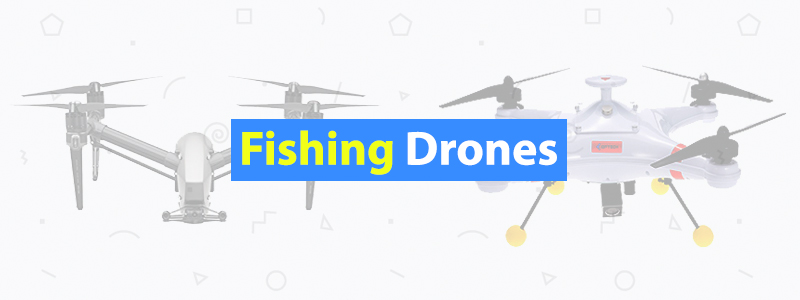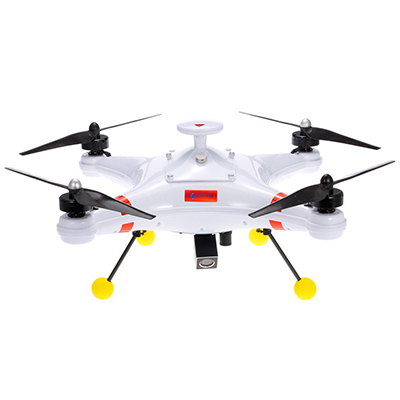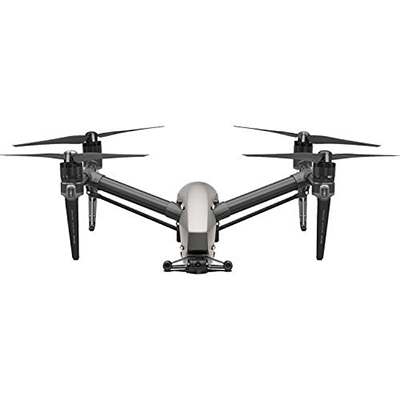What is Drone Fishing and How to Get Started
Most people fly drones to take aerial photos and video. Some enjoy the adrenaline-pumping sport of quadcopter racing. There’s another use for these flying robots, and it’s making quite a splash—literally. This page looks at the growing popularity of drone fishing. Yes, you did read that right. It’s a whole new approach to catching fish that’s getting the anglers excited.
Our guide reviews five fishing-capable drones, but don’t jump in at the deep end if you’re a novice. This short introduction explains how to catch fish using drones along with some vital considerations.
| Budget |
|---|
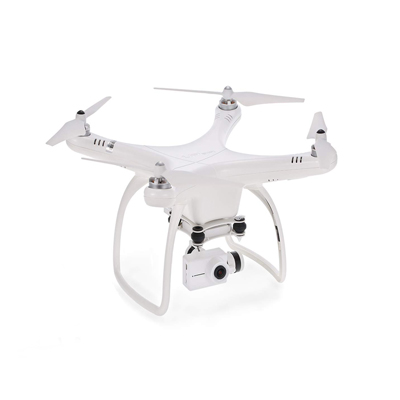 |
| UPair One Quadcopter |
| 4.4/5.0 |
| Flight Time: 15–18 minutes |
| Flight Range: 800 meters |
| Charging Time: 90 minutes |
| Beginner-friendly features, real-time WiFi transmission, good-quality FPV camera. |
| Check Amazon |
| Best Value |
|---|
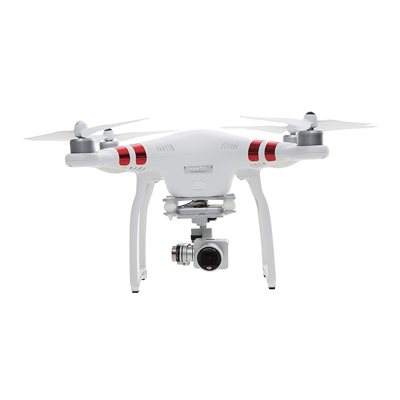 |
| DJI Phantom 3 Standard |
| 4.5/5.0 |
| Flight Time: 25 minutes |
| Flight Range: 0.5 miles (1km) |
| Charging Time: 60+ minutes |
| GPS assisted flight features, quality gimbal camera, app control for smart device. |
| Check Amazon |
| Top Pick |
|---|
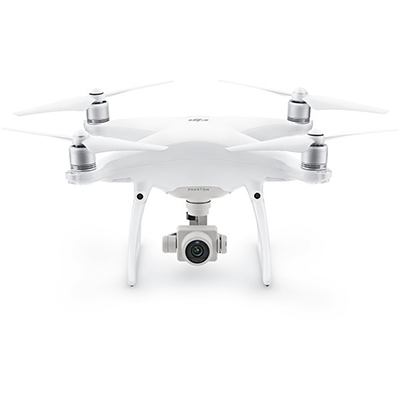 |
| DJI Phantom 4 PRO |
| 4.7/5.0 |
| Flight Time: 30 minutes |
| Flight Range: 4.3 miles (7km) |
| Charging Time: 60+ minutes |
| Excellent all-around camera quad, purpose-made fishing gadgets available. |
| Check Amazon |
Increase Your Catch with Drone Fishing
If you enjoy fishing, you’ll love fishing with drones. Think of it as an addition to your angling arsenal of techniques to improve your catch. There are two ways to use drones to catch fish.
- Scout for new fishing grounds from above
- Drone fishing with lines, hooks, and bait
You can use either drone fishing technique for freshwater or sea fishing with a little know how. However, first-time drone anglers must prepare well and understand the potential risks.
1. Scout for New Fishing Grounds
Scouting from above is an excellent technique, especially for sea fishing away from the beach. The drone’s camera has a birds-eye view of the water below and sends a live feed to the pilot. This is what’s known as First Person View or FPV for short. Anglers get to see what the quadcopter’s camera sees in real time. You can then move towards the shoal with baited hooks or fishing nets.
Entrepreneurial types can use the above method to make money. The job is to locate shoals of fish and drop groundbait to keep them in the area. The idea is to then sell the exact location of those fishing grounds to commercial anglers.
2. Drone Fishing with Lines, Hooks, and Bait
Another way to fish using drones is to equip the quad with special fishing tackle. However, it takes some skill, and there are risks. We’ll look at those in a moment. This method uses a baited fishing line attached firmly to the drone as it hovers over the water’s surface. It’s an approach that lets you reach far out sweet spots on rivers, lakes, or the sea.
Fishing like this can be unpredictable and risks losing your precious drone forever. All it takes is a fish that’s bigger and more powerful than the quad to end the expedition. It happens.
The safer drone fishing approach
Here’s a much safer method that removes this risk of the fixed-line approach above:
You must then lock the reel once the drone reaches the desired fishing location. The resistance on the line forces the release clip to let go and drops your baited hook into the water. That’s the drone’s job done. You then fly it back to base or use the one-key return-to-home (RTH) function if it has one.
How to Choose a Fishing Drone
Not all drones are suitable for fishing expeditions. You may also want to bait the waters with the quad before casting the line. The weight a drone can carry is its payload. Think about the payload capacity you need before you buy anything. However, not all drone makers list payload in the specs. It’s still possible to get the details for popular models by asking in community forums.
Enthusiasts often carry out their own payload tests. Just search for “Product Name + Payload test.” The payload is more of a concern when delivering fish bait and for direct line fishing (no release clip).
OK, here are 7 vital considerations for any fishing drone:
- Payload capacity: more is better
- Stable hover function and wind-resistance
- Maximum flight time or battery life: measured in minutes
- Maximum range: how far the quad can fly from its controller
- First Person View (FPV) camera if applicable
- Battery charging times and cost of spare batteries
- Waterproofing or water-resistance
Exploit Your Fishing Drone
There are many uses for drones outside of fishing. The more you exploit your flying robot, the more value it offers. Camera drones can capture stunning aerial photos and video. Homeowners use them for roof inspections and other such practical purposes. Drones have commercial benefits too like real estate, agriculture, travel, and surveillance, etc. You get the idea.
About this Drone Fishing Guide
The above introduction covers the benefits and methods of drone fishing. The rest of this page looks at a handful of drones that meet the requirements. Each mini-review explains why the quad is an ideal choice for fishing and highlights any cons it may have. My shortlist here is the result of personal research. I also took the opinions of industry experts and real user reviews into account.
Best Fishing Drones Comparison Table
The first three fishing quads are Best Budget, Best Value, and the Top pick for easy reference.
| Make and Model | Max Flight Time | Flight Range | Price Check |
|---|---|---|---|
| UPair One FPV Fish Catching Quadcopter | 18 minutes | 800 meters | Check Price |
| DJI Phantom 3 Standard Quad for Fishing | 25 minutes | 805 meters | Check Price |
| DJI Phantom 4 PRO Quadcopter for Fishing | 30 minutes | 4.3 miles | Check Price |
| Goolsky Poseidon-480 Pro Fishing Drone | 25 minutes | 800 meters | Check Price |
| DJI Inspire 2 Quadcopter Essential Bundle | 27 minutes | 4.3 miles | Check Price |
1. UPair One FPV Fish Catching Quadcopter (Best Budget)
Editor’s Rating: 4.4/5.0
The Best Budget fishing quadcopter goes to the UPair One 2.7K camera drone. It’s an affordable flying robot that’s easy to control, stable, and sports high average features.
The UPair One’s Fishing Potential
The UPair One 2.7K camera quadcopter is an excellent first choice inland fishing drone. It can fly out to a range of around 800m which is just under half a mile. The video transmission distance is only 500 meters. That makes the craft better suited to inland angling rather than sea fishing. One of the best features with the UPair One Drone is the controller’s built-in 7” screen.
Use this drone to locate the ideal fishing spots from above. You can also attach a line & bait to the quad to fish in otherwise hard to reach locations. The First Person View (FPV) gives a clear real-time transmission that makes fishing possible. Other fishing-friendly features include altitude hold, headless mode, and GPS positioning. There’s also the one-key return to home (RTH) function.
The Not So Good
The flight time in ideal conditions is around 15–18 minutes. That’s on the low side of average for a drone in its class. It’s better than some, but most pilots still invest in an extra battery or two. The camera has gimbal stabilization which is great. It’s only a 2-axis gimbal and not as good as a 3-axis for steadying the camera. Again, it’s not bad, but it could be better.
The final con is with the design of the UPair One Drone 2.7K. It has a solid build with no foldable parts. That makes the quad more cumbersome to travel with than smaller, more portable drones.
| Tech Specs |
|---|
| Dimensions: 19.1 x 15.3 x 9.7″ |
| Product Weight: 2.82 lbs. |
| Camera: 12MP 2.7K HD w/ gimbal |
| Max Flight Time: 15–18 minutes |
| Max Flight Range: 800 meters |
| Battery: 11.1V 5400mAh |
| Charging Time: 90 minutes |
| The Pros |
|---|
| Affordable price tag |
| Feature-packed quad |
| Beginner-friendly features |
| Real-Time WiFi transmission |
| Good-quality FPV camera |
| Controller w/ 7” screen |
| Gimbal stabilization |
| 1-key-return to home (RTH) |
| Altitude hold |
| Headless mode |
| The Cons |
|---|
| Low average flight time |
| Only 2-axis gimbal |
| Not travel-friendly |
2. DJI Phantom 3 Standard Quad for Fishing (Best Value)
Editor’s Rating: 4.5/5.0
The DJI Phantom 3 Standard is an oldie but goodie. This camera quad practically bolts itself to the sky. It’s this stability that provides angling pilots with super-steady flight performance for fishing.
The Phantom 3 Standard’s Fishing Potential
It’s possible to fish with a lot of quadcopters, but the Phantom 3 Standard is one of the favorites. There’s even a lightweight Gannet Bait Release designed for the drone. All it takes is two minutes of your time and you’re ready to fish. The bait release is fully autonomous and uses its own rechargeable battery. It can perform around 50 line drops from a single charge.
There are other tools too like the RCstyleAirDrop Release Fishing Bait. This one uses a wireless connection and works via a one-click operation up to 1km. You can also make your own device if you have a creative mind. Yes, the Phantom 3 Standard makes a perfect fishing drone. It’s easy to control, has altitude hold, GPS-assisted flight features, and a long 25 minute flight time.
The drone’s 2.7K HD First Person View (FPV) camera gives anglers a real-time birds-eye view. Battery recharging time is also impressive for such a powerful quad at just 60 minutes or less.
The Not So Good
The Phantom 3 is not the kind of drone you can throw into a small backpack. The sacrifice for such a stable design is that it’s not a travel-friendly quadcopter. The landing gear is somewhat rickety too. Lastly, price of extra Intelligent Flight Batteries is high for this model though they are exceptional.
| Tech Specs |
|---|
| Dimensions: 5 x 14 x 8.2” |
| Product Weight: 2.68 lbs. |
| Camera: Built-in 12MP 2.7K |
| Stabilizing gimbal: 3-axis |
| Max Flight Time: 25 minutes |
| Max Flight Range: 0.5 miles (1km) |
| Battery: 15.2V 4500mAh LiPo 4S |
| Charging Time: 60+ minutes |
| The Pros |
|---|
| GPS assisted flight features |
| Long flight time |
| Easy to fly |
| Super stable |
| First Person View (FPV) |
| Quality gimbal camera |
| Altitude hold |
| App control for smart device |
| Fast charging |
| The Cons |
|---|
| Not travel-friendly |
| Rickety landing gear |
| Expensive flight batteries |
3. DJI Phantom 4 PRO Drone Quad for Fishing (Top Pick)
Editor’s Rating: 4.7/5.0
Another DJI makes our top three shortlist of fishing drones. This time it’s the favorite Phantom 4 Pro Bakcpack Kit. It’s a camera quadcopter that enjoys a reputation for excellence on so many levels.
The Phantom 4 PRO’s Fishing Potential
The Phantom 4 Pro makes an excellent fishing drone. There’s even a video on YouTube that shows a couple of Aussie guys using one to fish for long-tail tuna. DJI’s Phantom 4 Pro checks plenty of the right boxes as an angling quad. It has a high-quality gimbal camera, a sturdy, lightweight build, long flight time, and an insane range. It’s also a stable flyer with 5-direction obstacle sensing.
There are plenty of fishing ideas, tips, and product ideas shared by the community. One favorite purpose-made tool is the FLiFLiAirDrop FAD-1000ST Release & Drop Device. The gadget is lightweight, unobtrusive, and simple to control when it’s time to drop the bait. It has a 1 mile wireless connection in ideal conditions and can function in temperatures as low as -4.
The Not So Good
The 30 minute flight time is excellent, yet most drone anglers still invest in extra batteries. DJI Intelligent Flight Batteries are exceptional but expensive. The Phantom 4 doesn’t come with propeller guards either. The prop guards are available online and cost around $25 at the time of writing.
| Tech Specs |
|---|
| Dimensions: 16 x 14 x 9” |
| Product Weight: 3 lbs. |
| Camera: 20MP 4k |
| Stabilizing gimbal: 3-axis |
| Max Flight Time: 30 minutes |
| Max Flight Range: 4.3 miles (7km) |
| Battery: 5870mAh 4S Li-Po |
| Charging Time: 60+ minutes |
| The Pros |
|---|
| Excellent all-around camera quad |
| Purpose-made fishing gadgets available |
| 5-direction obstacle sensing |
| Easy mode for beginners |
| Gesture controls |
| TapFly, Return to Home (RTH), ActiveTrack |
| Long flight time |
| Long control range |
| Intuitive DJI GO App |
| The Cons |
|---|
| High cost of DJI flight batteries |
| No prop guards |
4. GoolskyIDEAFLY Poseidon-480 Pro Fishing Drone
Editor’s Rating: 4.5/5.0
This is the only camera quadcopter on the page that uses “fishing” in the promotion. The full term is “Waterproof Professional Fishing Drone.” The name is what makes this bird so exciting.
The GoolskyIDEAFLY Poseidon’s Fishing Potential
IDEAFLY Poseidon brands itself as a purpose-made fishing drone. It checks a lot of boxes too and even has an IP67 waterproof level. IP67 confirms 100% protection against dust, sand, and liquids. The guarantee is that IP67 products can survive 1m underwater for at least 30 minutes. That alone gets the GoolskyIDEAFLY Poseidon-480 off to a fantastic start.
This quadcopter comes equipped with a First Person View (FPV) camera and a 7” FPV monitor. The image transmission range is around 800 meters. It’s possible to swap the stock camera with a 3-axis sports gimbal camera. The payload for the IDEAFLY Poseidon is 1200g. The drone has powerful brushless motors and an altitude hold function to keep it steady during fishing trips.
The quad houses a bait/net dispenser that boasts a large torque servo and a controllable hook. Drone anglers can use it to dispense bait or cast a fishing net. This bird resists winds up to level 5. It can also fly up to 25 minutes on a full battery and recharge in an impressive 40 minutes.
The Not So Good
With so many fishing features you may wonder why this waterproof quad didn’t make the top pick.
Well, it comes with an average 5.8G 700TVL HD FPV camera. It needs better optics to improve its appeal as a quality camera drone. It is possible to install a better 3-axis gimbal camera, but it’s an extra cost. There isn’t much user feedback either due to its niche appeal.
| Tech Specs |
|---|
| Dimensions: 20.5 x 20.5 x 10.6 |
| Product Weight: 6 lbs. |
| Camera: 700TVL |
| Max Flight Time: 25 minutes |
| Video Transmission Range: 800 meters |
| Battery: 22.2V 4500mAh 6S 25C LiPo |
| Charging Time: 40 minutes |
| The Pros |
|---|
| IP67 waterproofing |
| First Person View (FPV) |
| 7 inch FPV monitor |
| Supports 3-axis gimbal camera |
| 1200g payload capacity |
| Long flight time |
| Fast charging time |
| The Cons |
|---|
| Average quality camera |
| Little user feedback so far |
5. DJI Inspire 2 Quality Camera Quadcopter Bundle
Editor’s Rating: 4.6/5.0
The DJI Inspire 2 makes an excellent pro-level camera quadcopter. It works well as an angling drone too. Only professional pilots dare to fish with it due to the high cost of this bird and its accessories.
The DJI Inspire 2’s Fishing Potential
It’s unlikely that anyone would buy the DJI Inspire 2 only for fishing. However, pro-level aerial videographers and photographers may own one and also like to fish. There’s good news on that front. The quad has a robust magnesium alloy build, long flight time, and an incredible range. It has retractable landing gear, dual operator control, and First Person View (FPV) capability.
There are custom fishing tools for the Inspire 2 like the Gannet Payload Release. Operators can mount this angling device to the quad in seconds (no tools needed). There are similar gadgets around, though some brave folks prefer to use improvised devices. Purpose-made fishing mechanisms can do 20+ drops on a single charge as far away as 1000m from dry land.
The Inspire 2 is a fast flier and capable of accelerating from 0–50 mph in just 4 seconds. The top speed is somewhere around 67 mph in ideal conditions. That’s really useful. It means the drone can reach far out fishing spots—and back—in a short space of time.
The Not So Good
The only disadvantage to the DJI Inspire 2 is its high price tag. Many enthusiastic amateurs would love one of these incredible birds. Sadly, few can justify the cost. It’s the same for the extras like 5.2K gimbal cameras and the expensive Flight Batteries.
| Tech Specs |
|---|
| Dimensions: 18 x 12 x 21” |
| Product Weight: 7.58 lbs. |
| Camera: 2-Axis Stabilized FPV |
| Max Flight Time: 27 minutes |
| Max Flight Range: 4.3 miles (7 km) |
| Battery: 22.8V 4280mAh LiPo 6S |
| Charging Time: 90 minutes |
| The Pros |
|---|
| Tough magnesium alloy build |
| Long flight time |
| Long control range |
| Dual-battery design |
| Retractable landing gear |
| Dual operator control |
| High-end camera compatibility |
| Fast 58MPH top speed |
| 1080P live view |
| Obstacle avoidance |
| The Cons |
|---|
| High cost of quad and extras |
Contents
- Increase Your Catch with Drone Fishing
- 1. Scout for New Fishing Grounds
- 2. Drone Fishing with Lines, Hooks, and Bait
- The safer drone fishing approach
- How to Choose a Fishing Drone
- Exploit Your Fishing Drone
- About this Drone Fishing Guide
- Best Fishing Drones Comparison Table
- 1. UPair One FPV Fish Catching Quadcopter (Best Budget)
- The UPair One’s Fishing Potential
- The Not So Good
- 2. DJI Phantom 3 Standard Quad for Fishing (Best Value)
- The Phantom 3 Standard’s Fishing Potential
- The Not So Good
- 3. DJI Phantom 4 PRO Drone Quad for Fishing (Top Pick)
- The Phantom 4 PRO’s Fishing Potential
- The Not So Good
- 4. GoolskyIDEAFLY Poseidon-480 Pro Fishing Drone
- The GoolskyIDEAFLY Poseidon’s Fishing Potential
- The Not So Good
- 5. DJI Inspire 2 Quality Camera Quadcopter Bundle
- The DJI Inspire 2’s Fishing Potential
- The Not So Good

